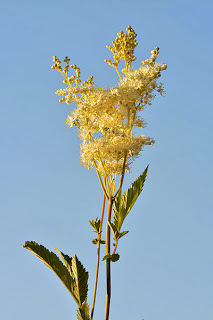Medicinal Properties and uses of Meadowsweet
Meadowsweet is an herbal plant that grows wild in parts of Europe and Asia. Although not a native of North America, it was brought over, and now grows wild in many areas. It has been used for over 4000 years. It was a sacred herb of the Druids, although it is unknown if they used it for medicinal purposes.
Meadowsweet is known by many names. It has been called queen of the meadow, dropwort, bridewort, and lady of the meadow, just to name a few. It has many uses. The flowers and leaves are used for teas, tincture, infusion, compresses, and eyewash. People have used it for cold symptoms such as fever, cough, sore throat, and to get rid of phlegm. The roots of meadowsweet are used for coughing and wheezing.
The plant of the meadowsweet, from the ground up, contains antioxidants. It also contains tannins. That makes it good for stomach and bowel complaints, such as ulcers, indigestion, and diarrhea. It is effective for treating many skin irritations, like acne. It even helps with symptoms of measles and chickenpox.
The antiseptic, antibacterial, and diuretic properties of meadowsweet make it effective in curing urinary tract infections, dissolving kidneystones, plaque from arteries, and as a cure for conjunctivitis. It rids the body of uric acid, which causes gout and kidney stones. It is also associated with diabetes.
The pain reducing and anti-inflammatory effects of meadowsweet have been no secret to the many people who have used it over the centuries. German researchers discovered Salicylic acid and called it aspirin.
Meadowsweet helps to alleviate the pain of headaches, joint and muscle pain, arthritis, and rheumatism. It reduces fevers and can help promote sweating.
Very few studies have been made on meadowsweet in the United States. It has not been approved by the FDA. The German Commission E has approved the use of meadowsweet for the common cold. The approved dosage of 2.5 to 3.5 grams of the flower in tea, taken 3 times a day., or 4 to 5 grams of the herb in tea, taken 3 times a day. It is estimated that 75% of people in the world use herbal medications.
It should not be given to children due to the risk of causing Reye's Syndrome. It should not be taken by anyone with allergies to aspirin. It increases the risk of bleeding if taken with NSAIDS or anticoagulant drugs. Do not take meadowsweet with the medications Bismuth Subsalicylate or Ticlopidine.
Picture by Ivar Leidus



Comments
Post a Comment